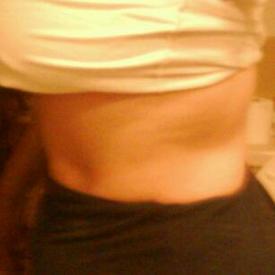We are pleased to announce that on March 4, 2025, an updated Rich Text Editor will be introduced in the MyFitnessPal Community. To learn more about the upcoming changes, please click here. We look forward to sharing this new feature with you!
1 Pound Of Fat = 3,500 Calories

allashram
Posts: 9
There are 3,500 calories in one pound of fat. Thus, if you cut back or work off just 3,500 calories, you will lose an entire pound of fat. While it is possible to cut back on your calorie intake and increase your exercise regimen in order to lose pounds quickly, it is important to note that doctors recommend that you lose no more than 2 pounds of weight per week in order to ensure that your body properly adjusts to the weight loss.
Here are some tips to help you safely drop 3,500 from your regular routine:
Run
Running for about 1 hour at a slow pace will help you lose approximately 350 calories, depending on your body type, speed and terrain. Thus, if you run for one hour five days a week while maintaining a consistent diet, you will safely lose one pound.
It is important to understand that many people who just begin running will eat pasta and other foods high in carbohydrates in order to compensate for the exertion. They think that because they worked out so hard, they deserve a treat. After all, they justify, the pasta will help to keep their energy levels high.
However, what they may not realize is that while they are justified in thinking that the carbohydrates will infuse their workout routine with energy, they are not actually setting their bodies up to lose weight. When you burn 350 calories but intake 450 over a high-carbohydrate pasta dish, you are adding more calories to your body than you otherwise would have.
0
Replies
-
The body adapts very quickly to running and other cardio exercises. To keep losing we need to keep increasing the intensity, duration, or distance that is done. The smaller we become, the more efficient our bodies are.
If you keep doing this, you risk injury, exhaustion, or at least the feeling that you are spinning your wheels.
You're working so hard, why aren't you losing weight? Running alone is not the answer.0 -
Yeah, if only it was that simple! :laugh:0
-
1) One pound equals 454 grams (decimal places aside, this is a fact);
2) Fat has nine calories per gram (this is the universally accepted conversion, but it is an estimate and significantly rounded down from even the original estimate);
3) Human fat tissue is approximately 87% lipid (this is a widely accepted conversion, but it is also an estimate).
Putting these together, we can derive the sum that 454 grams of body fat tissue has approximately the calorific energy of 395 grams of pure fat (454 grams x 87%), that is 3,555 calories (395 grams x 9).
3,555 is close enough to 3,500 you may think, until you see the absurdity of how precisely the formula is applied. According to those who believe this formula, this difference of 55 calories (in this case from the calculation being approximate) would make five to six pounds difference a year.0 -
moral of the story:
maintain a moderate deficit with consistency to lose weight.0 -
Wait, so you're telling me that if I eat more calories than I burn I won't lose weight?

 0
0 -
Wait, so you're telling me that if I eat more calories than I burn I won't lose weight?


Hehehe...I love those little yellow guys!!0 -
1) One pound equals 454 grams (decimal places aside, this is a fact);
2) Fat has nine calories per gram (this is the universally accepted conversion, but it is an estimate and significantly rounded down from even the original estimate);
3) Human fat tissue is approximately 87% lipid (this is a widely accepted conversion, but it is also an estimate).
Putting these together, we can derive the sum that 454 grams of body fat tissue has approximately the calorific energy of 395 grams of pure fat (454 grams x 87%), that is 3,555 calories (395 grams x 9).
3,555 is close enough to 3,500 you may think, until you see the absurdity of how precisely the formula is applied. According to those who believe this formula, this difference of 55 calories (in this case from the calculation being approximate) would make five to six pounds difference a year.
I appreciate this breakdown. Since I started a weight loss/fitness regiment 7 weeks ago, I've been trying to be as scientific as I can about it. I've always questioned where 3500 came from, it seems to be thrown out as a constant like gravity on Earth. My main question was if it was variable by person, but your explanation shows that's not the case.
It seems like muscle loss further complicates things. I read somewhere (and it's from a source I grant no credibility to,but let's go with it for an example) that during weight loss, 75% would be from fat, 25% from muscle, if the body isn't in "starvation" mode that is. So does muscle count as protein? If so, it seems that 1 pound muscle would provide 1816 calories * L (where L is some lipid factor, like the .87 for fat). I'm going to stop going down this rabbit hole because I just don't know enough about this subject. I made some weighted average formula but I'm sure it's invalid.0 -
1) One pound equals 454 grams (decimal places aside, this is a fact);
2) Fat has nine calories per gram (this is the universally accepted conversion, but it is an estimate and significantly rounded down from even the original estimate);
3) Human fat tissue is approximately 87% lipid (this is a widely accepted conversion, but it is also an estimate).
Putting these together, we can derive the sum that 454 grams of body fat tissue has approximately the calorific energy of 395 grams of pure fat (454 grams x 87%), that is 3,555 calories (395 grams x 9).
3,555 is close enough to 3,500 you may think, until you see the absurdity of how precisely the formula is applied. According to those who believe this formula, this difference of 55 calories (in this case from the calculation being approximate) would make five to six pounds difference a year.
I appreciate this breakdown. Since I started a weight loss/fitness regiment 7 weeks ago, I've been trying to be as scientific as I can about it. I've always questioned where 3500 came from, it seems to be thrown out as a constant like gravity on Earth. My main question was if it was variable by person, but your explanation shows that's not the case.
It seems like muscle loss further complicates things. I read somewhere (and it's from a source I grant no credibility to,but let's go with it for an example) that during weight loss, 75% would be from fat, 25% from muscle, if the body isn't in "starvation" mode that is. So does muscle count as protein? If so, it seems that 1 pound muscle would provide 1816 calories * L (where L is some lipid factor, like the .87 for fat). I'm going to stop going down this rabbit hole because I just don't know enough about this subject. I made some weighted average formula but I'm sure it's invalid.
completely understand your curiosity!! Im not sure it goes as deep as this, but it would be interesting to find out!0 -
1) One pound equals 454 grams (decimal places aside, this is a fact);
2) Fat has nine calories per gram (this is the universally accepted conversion, but it is an estimate and significantly rounded down from even the original estimate);
3) Human fat tissue is approximately 87% lipid (this is a widely accepted conversion, but it is also an estimate).
Putting these together, we can derive the sum that 454 grams of body fat tissue has approximately the calorific energy of 395 grams of pure fat (454 grams x 87%), that is 3,555 calories (395 grams x 9).
3,555 is close enough to 3,500 you may think, until you see the absurdity of how precisely the formula is applied. According to those who believe this formula, this difference of 55 calories (in this case from the calculation being approximate) would make five to six pounds difference a year.
I appreciate this breakdown. Since I started a weight loss/fitness regiment 7 weeks ago, I've been trying to be as scientific as I can about it. I've always questioned where 3500 came from, it seems to be thrown out as a constant like gravity on Earth. My main question was if it was variable by person, but your explanation shows that's not the case.
It seems like muscle loss further complicates things. I read somewhere (and it's from a source I grant no credibility to,but let's go with it for an example) that during weight loss, 75% would be from fat, 25% from muscle, if the body isn't in "starvation" mode that is. So does muscle count as protein? If so, it seems that 1 pound muscle would provide 1816 calories * L (where L is some lipid factor, like the .87 for fat). I'm going to stop going down this rabbit hole because I just don't know enough about this subject. I made some weighted average formula but I'm sure it's invalid.
That was my understanding too, that some muscle (and presumably, eventually, some other stuff too) is lost alongside fat. The 3500 figure assumes pure fat loss.
However, as a rough guide, it seems to work for me. I do seem to lose weight, VERY approximately, at the rate of about a pound per 3500 calorie deficit.0 -
My only real comment is that the calories burnt per hour of slow ruming seems to be a very low figure from what I have seen anywhere else.0
This discussion has been closed.
Categories
- All Categories
- 1.4M Health, Wellness and Goals
- 394.3K Introduce Yourself
- 44K Getting Started
- 260.4K Health and Weight Loss
- 176.1K Food and Nutrition
- 47.5K Recipes
- 232.7K Fitness and Exercise
- 440 Sleep, Mindfulness and Overall Wellness
- 6.5K Goal: Maintaining Weight
- 8.6K Goal: Gaining Weight and Body Building
- 153.1K Motivation and Support
- 8.1K Challenges
- 1.3K Debate Club
- 96.4K Chit-Chat
- 2.5K Fun and Games
- 4K MyFitnessPal Information
- 16 News and Announcements
- 1.2K Feature Suggestions and Ideas
- 2.7K MyFitnessPal Tech Support Questions








